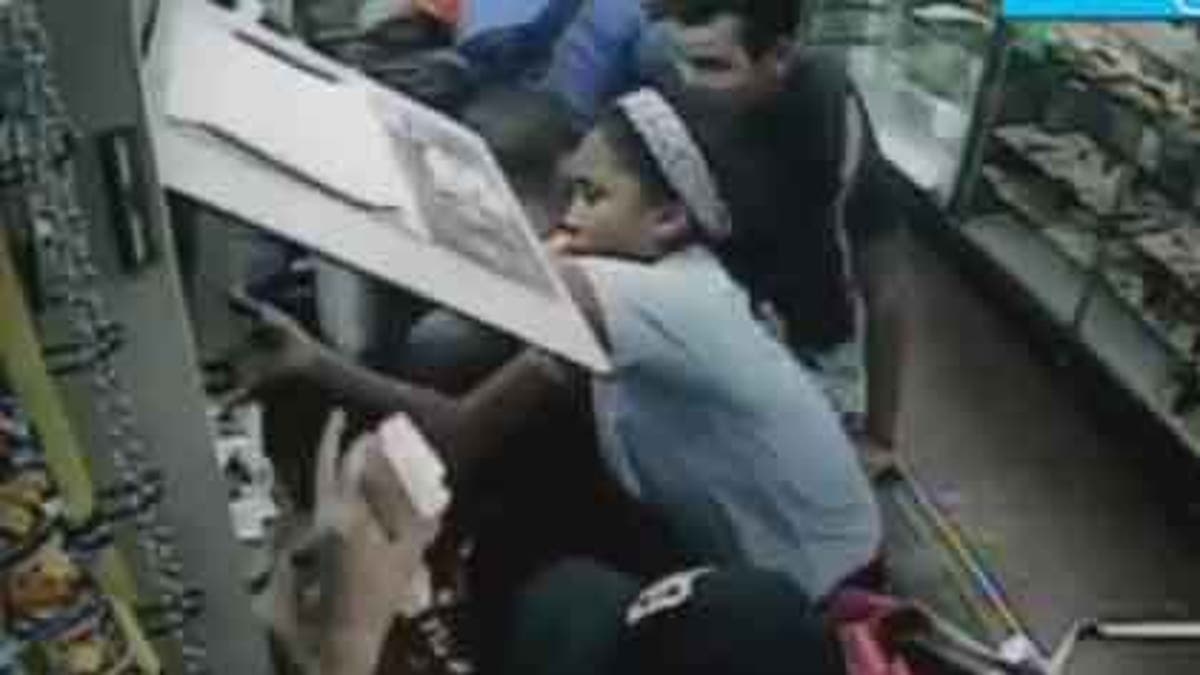
(Courtesy: Myteks Media Labs)
CARACAS, VENEZUELA - On June 9, a furious round of looting shocked the streets of Petare, a popular segment in the east of Caracas. More than a week later, there is still evidence of the damage.
A bakery called Flor del Rocio 2007 now operates with its doors permanently half-closed — on that day a mob raided in, took all the edible items they found and even stole the cash register and some appliances, all the while shattering the store’s windows and destroying the furniture.
Shop owners and employees are scared.
“We shut the doors when things started to get out of hand outside. But some clients wanted to leave and we had to open,” said an employee of the bakery who requested to withhold his name.
“In that moment dozens of people entered and they were impossible to control,” the employee told Fox News Latino. “They had helmets and sticks. We had to hide in the back of the store while they took everything, from chocolates to ham and cheese. It all happened in around 30 minutes,” he added.
A similar situation repeated that same day in other stores around Petare, with mobs also attacking food trucks in the middle of the street.
These food riots are becoming increasingly common. La Vega and Carapita neighborhoods, in western Caracas, saw fierce lootings last week, as did many other across Venezuela.
The New York Times reported that in the last two weeks alone more than 50 food riots took place around the country and at least five people have been killed — including a four-year-old girl.
In Cumana, the capital of the state of Sucre, hundreds took to the streets and looted dozens of stores on June 14. At least 400 people were arrested.
The escalation of violence and looting is being followed closely by Venezuela’s Observatory of Social Conflict, OVCS for its initials in Spanish. In May the group reported 82 lootings or looting attempts, up from 23 in January.
In the first five months of 2016, they counted a total of 254 acts of looting.
“In the first two weeks of June we already received 145 alerts of looting. We still have to process the data, but we will see an important increase this month,” Marco Antonio Ponce, head of the Observatory, said to FNL.
If confirmed, it would mean nearly 10 violent acts per day take place in Venezuela.
The situation is complicating the life of food trucks drivers, whose daily routine is suddenly full of dangers. People from towns alongside highways are usually on the lookout and organize to block the route and force them to stop.
A lot of times truck drivers entering risky territory ask to be escorted by military personnel.
"I was traveling to the east of the country and saw more than 20 truck drivers parked in a town call El Guapo waiting for military personnel to escort them the rest of the way," Pedro Luis Flores, a journalist from Caracas, told FNL.
"Miles ahead, men, women and even children were waiting for trucks on the sides of the road with stones and sticks in their hands," he added.
In the aftermath of last week’s violence, President Nicolas Maduro said that the organizers of the lootings should be sentenced to “20 years in jail.”
“There is a criminal plan behind all this. Some of the arrested are linked to [opposition political parties] Primero Justicia and Voluntad Popular,” he said on Thursday.
But many experts say the president’s argument about a political conspiracy is baseless.
“As far as we know, based on all the social studies that we have done, most of the protests for food and lootings are spontaneous,” OCVS’s Ponce told FNL.
“People are angry because it’s not easy to find food and they want the government to solve the problem,” he said. “Protests and lootings are scattered and uncoordinated. The government is just trying to criminalize people to have an excuse to suppress all these demonstrations.”
Last month Maduro’s socialist government implemented a new food distribution system controlled by party loyalists – as many as 70 percent of price-controlled products are distributed by these selective groups.
The number of protests and lootings has skyrocketed after the plan was put in practice.
“People feel the possibility of being politically discriminated and that angers them,” Ponce said.
In the past few days the government increased security across the country, with military personnel and special police forces patrolling the streets to prevent violent outbreaks.
But store owners and their employees are still afraid about the possibility of becoming targets.
“We still are nervous while we work. We have reduced the operating hours from 7 am to 8 pm to 9 am to 6 pm,” an employee from another Petare bakery, El Jardin del Pan, told FNL.
The employee said the food supplies shortages are also affecting the store directly.
“We cut from 22 employees to just six. We don’t have any wheat flour to bake bread,” the employee said.
